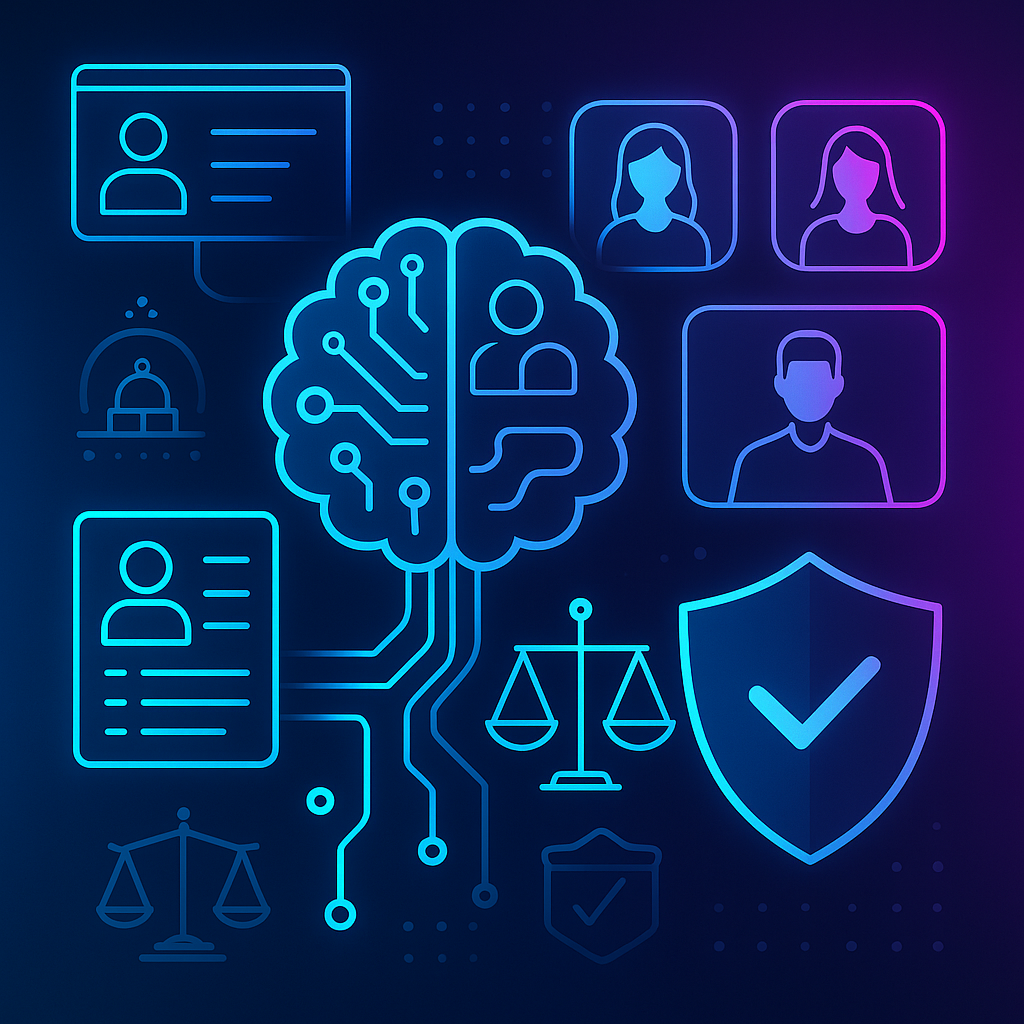Top 5 Benefits of Recruitment Automation and How AI Makes it Even Better!

When it comes to robotics, recruitment automation, and technology, humans tend to have very mixed emotions. “On one hand, there’s anxiety about robots,” said Kate Darling, an expert in robot ethics at the MIT Media Lab. “And on the other hand, people are fascinated by them. We’re hypocritical.”
Over the past few years, robotics has become increasingly prevalent in every industry from manufacturing to agriculture, to healthcare, to recruiting. Although respected economists such as Dr. Erik Brynjolfsson and David Autor have professed that robots are creating jobs rather than eliminating them, about 75 percent of Americans still believe that robots will do the majority of jobs currently done by humans in 50 years.
Suggested reading on automated recruiting: Discover how AI is being leveraged for the recruiting industry
So, before we get into the benefits of Automated Recruiting — that too, typically, powered by AI – let’s first understand what is it.
What is AI in recruitment automation?
Recruitment automation represents innovative technologies that set up workflows automatically for diverse tasks linked to recruitment. These include sourcing candidates, updating spreadsheets, communications, scheduling, and more. It also streamlines assessments which take up a great deal of time. Artificial intelligence is what enables recruitment automation, backed up by scalable machine learning and insights.
AI helps nurture and engage with candidates, while taking care of candidate sourcing, screening, and scheduling. It represents a flexible and personalized option for companies and recruiters. At the same time, it is not a replacement for actual recruiters. In contrast, the goal of automated recruiting software is actually not to cut down on costs by replacing human recruiters. Rather, its purpose is to empower recruiters and enhance the whole recruiting process, for both recruiters and candidates. As is the case in so many other instances, technology in the recruiting industry is only as good as the people who use it.
Suggested Read – Four things to look for in an AI recruiting tool
Now, here are a few of the many benefits of automated recruiting:
Recruitment Automation Benefits
Huge time savings
The most obvious benefit of automated recruiting software is the time recruiters save by automating parts of their process. The average recruiter spends anywhere from 40 to 60 percent of their workday searching for new candidates. By automating the sourcing and initial screening processes, recruiters gain 3 to 5 hours back each day that can be spent engaging with candidates, interviewing applicants, and performing other tasks that require human intelligence. As HR guru Sharlyn Lauby said, “when you automate the right tasks, then it frees up time to do the in-person ones better.”
Don’t we all wish there were more hours in a day? Automated recruiting software grants recruiters this wish.
Smarter process
Lou Adler, CEO of the Adler Group, contends that recruiting technology is about finding the best, rather than weeding out the weak—he calls it the “smartification” of recruiting. Automated recruiting software can be equipped with predictive analytics to understand candidates better and predict which will be successful in a role. In fact, a recent study conducted by the National Bureau of Economic Research suggests that algorithms are capable of making better hiring decisions than humans.
The study observed over 300,000 hires made across 15 companies. The study required the companies to implement hiring assessments created by PeopleMatter that asked candidates a variety of questions about their technical skills, personality, cognitive skills, and fit for the job. In some cases, hiring managers were removed from the process, and hiring decisions were made by an algorithm that based the decision on the test results. In other cases, hiring managers used their discretion to override the algorithm’s suggestion for the position. The result? Retention rates increased by 15 percent when the algorithm made the decision.
Why does it matter? Obviously, higher retention rates are better for the growth and prosperity of your company. But also, it’s estimated that replacing a single employee costs companies an average of six to nine months’ salary, between recruitment efforts, training costs and productivity losses. It looks like the “smartification” of the recruiting process might be well worth investing in.
Knowledge retention
You have one star recruiter at your company. She’s been there for years, understands your company’s unique needs and knows all the best tactics for attracting great candidates. So, what do you do when she leaves your company?
With automated recruiting software, you won’t have to worry. Highly intelligent automated recruiting software utilizes machine learning to recognize your recruiters’ best practices, retain the information and replicate their actions—even if they leave your company. The knowledge retention aspect of automated recruiting software enables all of your recruiters to be as effective as your best recruiter, decreasing the training and ramp-up time required by new recruiters.
Automated recruiting software allows you to retain a goldmine of valuable data. Think about how your recruiting process could be enhanced if you had access to this mine!
Enhanced candidate experience
In our candidate-driven job market, one of the recruiters’ biggest priorities is to provide a stellar candidate experience. But how can recruiters accomplish this, when there are an average 250 resumes submitted for each job opening? The answer, of course, is with automated recruiting software.
Automated recruiting solutions create easy, one-click applications in order to encourage more candidates to apply. The software also has the capability to stay in constant contact with applicants, giving candidates timely updates on their status in the recruiting process. Additionally, automated recruiting software leads to a reduced time-to-hire, another factor that improves overall candidate experience. Providing a VIP candidate experience doesn’t require a ton of effort from the recruiter—try enlisting the help of automated recruiting software to get the job done.
Greater diversity
Using automated recruiting software can lead to greater diversity in your workplace. Because automated recruiting software relies on data, conscious and subconscious human biases are largely eliminated from the recruiting process.
“Every company vets its own way, by schools or companies on résumés,” said Sheeroy Desai, co-founder and CEO of Gild, a recruiting software company. In fact, a recent international survey conducted by Cubiks Consultancy revealed that 80 percent of hiring managers strongly value likeness between the interviewee and themselves. “It can be predictive, but the problem is it is biased. They’re dismissing tons and tons of qualified people,” said Desai.
Suggested resource on diverse workforce: Recruiting Strategies to attract a more diverse candidate pipeline
Hiring people based on their likeness to you will not only create a homogenous workforce but might also diminish your company’s productivity. According to Katherine Phillips, an associate professor of management and organizations at the Kellogg School of Management at Northwestern University, diversity actually enhances group work. “The mere presence of diversity in a group creates awkwardness, and the need to diffuse this tension leads to better group problem solving,” Phillips says. Meanwhile, in groups lacking diversity, members are more likely to blindly agree on everything rather than cause any disturbance in the group dynamic. Diverse groups have been found to complete tasks better than non-diverse groups.
Aiming to achieve diversity in your organization is the ethically right thing to do, and it also enhances your overall company efforts. Diversify your workplace with automated recruiting software.
With all of the great benefits that automated recruiting software and other recruiting technologies have to offer, it is a mistake to ignore their growing popularity. Stay ahead of your competition and land the best talent with the help of automated recruiting software.
Additional benefits of recruitment automation
There are many additional benefits of automated recruiting solutions. These include the following:
- Wider sourcing network – The wider the talent pool to choose from, the better the chance of finding the right candidate. However, sifting through hundreds of aspirants can be tediously time-consuming for any HR manager. Fortunately, you can rely on an AI recruiting tool to do the same — at a much higher speed and scale. It can source quality candidates from among millions across various online job boards and communities.
- Talent pipeline management – With your ATS/CRM integrated with AI-driven recruitment solutions, you get total visibility of the entire candidate pipeline at all times – both internal and external.
- Flexible recruitment drives – With automation, you can either scale up your hiring process as per requirements or squeeze it in case of changing scenarios or requirements. This does not require a disruptive shift as in regular cases.
- Reliable compliance – You can expect proper adherence to all regulatory guidelines and compliance with other protocols with automated solutions for recruitment. This is especially critical for companies or agencies that offer sensitive services like healthcare recruitment.
- Insightful Analytics– Automating the recruitment procedure with an effective AI recruiting tool, for instance, will give you trackable insights, data on candidates, campaign data, and more. You can leverage them to stay a step ahead in building even effective recruitment processes with time.
How to identify recruitment automation opportunities?
You have the tool for recruitment automation and understand its benefits as well, but the process of implementation should always start with identifying which task needs to be automated in the first place. List down all the steps or activities your recruitment team does, then ask yourself the following question for each of them:
- Is repetitive and involves a high amount of manual effort?
- Is prone to human or manual errors?
- Is there a set of defined rules and mechanisms behind it?
- Is it a stable task that will not change immediately in the near future?
- Is there a simple safety valve in place to tackle mistakes?
Suggested resource on HR methodology: How to build HR flexibility and resilience post-COVID
What are the recruitment tasks that can be automated?
Once you have an idea about which task needs to be automated (and which should be better managed by HR managers), you can make your call of automation basis your access and features of your AI recruiting software.
Some of the common tasks that many HR managers prefer to automate include:
- Pre-screening and segregation of candidates into buckets based on various parameters
- Automating questionnaires and candidate assessments
- Automating candidate communication through emails/messages at various stages
- Automating reminders and follow-ups
- Automating scheduling, rescheduling, and follow-ups for interviews and meetings
As you might have noticed, while tasks of communication, file sorting, and similar can be achieved with regular automated recruiting software but when it comes to tasks that involve decision-making, especially candidate screening, it’s more in the court of AI to handle it.
What are the benefits of automated candidate screening?
There salient advantages of automated candidate screening are:
- Better recruitment workload organization
- Enhanced recruitment productivity
- Avoiding biases and adhering to DEI goals
- Scaling up recruitment as per requirements
The biggest contribution of automated candidate screening is that it lowers the team’s time on various procedures that are otherwise repetitive and time-consuming while ensuring lower scope for human errors.
Conclusion
AI-based recruitment solves several issues for HR managers at every stage of the recruitment process. It ensures a wider sourcing pool for candidates, along with automated communication and engagement. At the same time, it is customizable to reflect DEI goals and other organizational objectives. Simultaneously, it also covers candidate nurturing and scheduling of appointments/interviews, thereby saving time and costs greatly. AI recruitment tools are witnessing rapid adoption worldwide and should play a pivotal role in helping companies find the best talent while enjoying time and cost savings alongside.
FAQs
Can recruitment be automated?
Yes, recruiting can be automated with the right solutions and tools. You can streamline and manage the entire procedure of sourcing, communicating with, scheduling, and assessing candidates. This saves time and money for companies.
How many companies use AI recruiting?
Several studies have indicated that 99% of Fortune 500 companies use AI recruiting tools. The figure will only be bound to increase in the future.
Which company uses AI in recruitment?
Several companies are using AI in the recruitment procedure, including PwC, Vodafone, Unilever, Oracle, Starbucks, Audible, Hilton, and L’Oreal, to name a few.
Will AI replace recruiters?
AI is not a replacement for recruiters. It helps automate particular tasks which are repetitive and time-consuming, freeing up recruiters to focus on more crucial activities. AI helps recruiters enhance candidate experience while making the entire recruitment process more efficient at the same time.
What is AI screening?
AI-based screening revolves around the automated screening of resumes and profiles through artificial intelligence on the databases of recruiters/organizations. The software intelligently screens and filters candidates on the basis of specific parameters.
Resources
- https://www.inc.com/adam-vaccaro/the-future-of-recruiting-automation.html
- https://www.theatlantic.com/technology/archive/2016/03/humans-robots-future/472749/
- https://www.huffingtonpost.com/entry/robots-jobs-economist-erik-brynjolfsson-video_us_56f954cbe4b0143a9b48af6b
- https://blogs.wsj.com/economics/2015/02/25/be-calm-robots-arent-about-to-take-your-job-mit-economist-says/
- https://mashable.com/2016/03/10/robots-are-coming-to-take-our-jobs-just-not-my-job/#SB_qxlabmqqz





